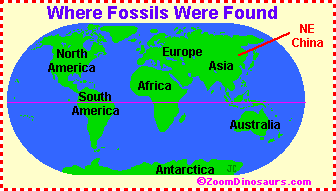Advertisement.
EnchantedLearning.com is a user-supported site.
As a bonus, site members have access to a banner-ad-free version of the site, with print-friendly pages.
Click here to learn more.
(Already a member? Click here.)
Caudipteryx zoui
Caudipteryx (meaning "tail feather") was a feathered theropod dinosaur dating from the late Jurassic period to perhaps the early Cretaceous period, roughly 120-136 million years ago. Caudipteryx resembled Velociraptor and may be the closest-known ancestor of birds.
In the chain of creatures leading from theropod (dromaeosaurid) dinosaurs to birds, Sinosauropteryx is the earliest bird-like dinosaur. For now, the chain includes (in chronological order):
- Archaeopteryx - The oldest known bird (150 mya) had asymmetrical feathers - it could probably fly short distances (from Germany).
- Sinosauropteryx - covered with proto-feathers and with short arms (121-135 million years ago).
- Protarchaeopteryx - Long, symmetrical feathers on arms and tail, but it probably could not fly (from China, 121-135 mya).
- Caudipteryx - a small, very fast runner covered with primitive (symmetrical and therefore flightless) feathers. (from China, 121-135 mya)
- Unenlagia - a much larger ground-dwelling theropod (from Argentina). It had flexible arm movement (up and down, like that of a bird) (90 mya).
- Velociraptor - a larger, ground-dwelling carnivore from Mongolia) with a swiveling wrist bone (this type of joint is also found in birds and is necessary for flight) (85 - 80 mya).
- Eoalulavis (from Spain) - the earliest bird that had good maneuverability while flying, even at low speeds (this extra flight control is obtained from a tuft of feathers on the thumb called the alula - it also helps in takeoffs and landings).
FEATHERS
Caudipteryx had feathers covering its very short arms, most of its body, and on its short tail. The feathers ranged from downy to structured quills with shafts and veins up to 6 to 8 inches (15-20 cm) long.
Its feathers were symmetrical, which indicated that it did not fly (modern-day flightless birds have symmetrical feathers; flying birds have asymmetrical ones). Protarchaeopteryx's feathers may have been used for insulation, retaining in its body heat.
ANATOMY
Caudipteryx had long legs, very short arms, and was about the size of a turkey, about 3 feet (1 m) tall. It lacked the typical theropod long tail but had a short tail with a generous fan of feathers up to 6 to 8 inches (15-20 cm) long. Its teeth were long, sharp, and had deep, bulbous roots. These teeth were only in the front of the upper jaw, and pointed outward, giving it a buck-toothed look. It was found with gatroliths (gizzard stones) in its gut that were used to grind up its food.
BIRDS AND DINOSAURS
"For the first time we have something that is unquestionably a dinosaur with unquestionable feathers. So what we have is a missing link between meat-eating dinosaurs and the earliest bird,'' said paleontologist Philip Currie of the Royal Tyrrell Museum of Paleontology, Drumheller, Alberta, Canada, "This shows that dinosaurs are not extinct, but are well-represented by 10,000 species of birds." The existence of Protarchaeopteryx, Sinosauropteryx, and Caudipteryx lends credence to the theory the birds are descended from theropod dinosaurs and not from 4-legged arboreal (tree living) reptiles. There are, however, dissenting voices who point out that the new feathered fossils are from a time after that of Archaeopteryx, the first bird (which lived about 147 million years ago, before Caudipteryx and Protarchaeopteryx). This suggests that perhaps the fossils' resemblance to birds could be a case of convergent evolution and that their feathers evolved for insulation, not flight, indicating a warm-blooded physiology.
LOCOMOTION
Caudipteryx did not fly but ran on two long legs. It was probably a swift runner given its long legs and slight body.
OTHER FEATHERED DINOSAURS
Other Chinese feathered dinosaurs dating from between 145
and 125 million years ago (during the late Jurassic and early Cretaceous periods) have been found in the same area of China. These fossils, Sinosauropteryx and the more primitive Protarchaeopteryx robusta have features which are more dinosaur-like than bird-like, and are considered to be theropod dinosaurs. Their feathers were all symmetrical, which indicates that none of them could fly. These other finds reinforce the theory that birds are descended from dinosaurs.
FOSSILS
 Two specimens of the fossil Caudipteryx have been found in the sediment of an ancient lake bed in China's Liaoning Province (in northeastern China) and were identified by Philip Currie.
Two specimens of the fossil Caudipteryx have been found in the sediment of an ancient lake bed in China's Liaoning Province (in northeastern China) and were identified by Philip Currie.
LINKS
Protarchaeopteryx
Sinosauropteryx
An article about Caudipteryx and Protarchaeopteryx from National Geographic.
Feathered dinosaurs from ABC news with pictures.
Birds and dinosaurs from CNN.
 Information Sheets About Dinosaurs Information Sheets About Dinosaurs
(and Other Prehistoric Creatures) |
Just click on an animal's name to go to that information sheet. If the dinosaur you're interested in isn't here, check the Dinosaur Dictionary or the list of Dinosaur Genera. Names with an asterisk (*) were not dinosaurs.
How to write a great dinosaur report.
For dinosaur printouts, click here.For brief dinosaur fact sheets, click here.
Enchanted Learning®
Over 35,000 Web Pages
Sample Pages for Prospective Subscribers, or click below
Click to read our Privacy Policy
Enchanted Learning Search
|
Search the Enchanted Learning website for:
|
Advertisement.
Advertisement.
Copyright ©1996-2018
EnchantedLearning.com ------ How to cite a web page


